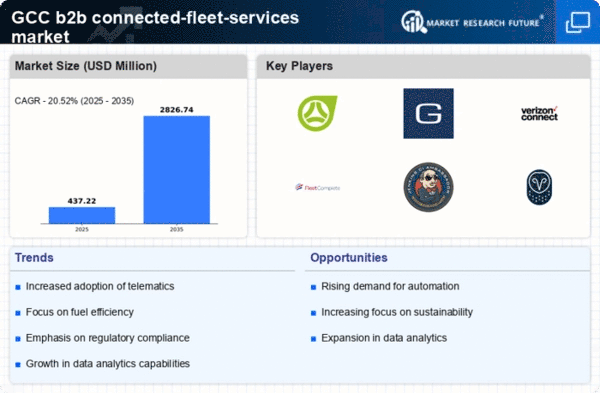Focus on Cost Reduction Strategies
In the competitive landscape of the b2b connected-fleet-services market, companies are increasingly prioritizing cost reduction strategies. Fleet operators are under pressure to minimize expenses while maintaining service quality. The integration of connected technologies allows for better fuel management, route planning, and vehicle maintenance scheduling, which can lead to substantial cost savings. In the GCC, where fuel prices can fluctuate, optimizing fuel consumption is particularly critical. Reports suggest that companies utilizing connected fleet services can achieve up to 20% savings in fuel costs. This focus on cost efficiency is likely to drive further investment in connected fleet technologies, as businesses seek to enhance their operational margins.
Rising Demand for Fleet Optimization
The b2b connected-fleet-services market is experiencing a notable surge in demand for fleet optimization solutions. Companies are increasingly seeking ways to enhance operational efficiency and reduce costs. In the GCC region, the logistics and transportation sectors are pivotal, with a projected growth rate of approximately 7.5% annually. This growth is driven by the need for real-time tracking and management of fleet operations, which can lead to significant savings in fuel consumption and maintenance costs. As businesses strive to improve their bottom line, the adoption of connected fleet services that provide insights into vehicle performance and driver behavior is becoming essential. This trend indicates a shift towards data-driven decision-making, which is likely to shape the future of fleet management in the region.
Government Initiatives and Regulations
Government initiatives in the GCC are playing a crucial role in shaping the b2b connected-fleet-services market. Regulatory frameworks aimed at enhancing road safety and reducing environmental impact are being implemented. For instance, the introduction of stricter emissions standards is compelling fleet operators to adopt connected technologies that monitor and manage vehicle emissions. Additionally, various governments are investing in smart city projects that integrate connected fleet services into urban infrastructure. This alignment with national visions, such as Saudi Arabia's Vision 2030, is expected to drive the adoption of innovative fleet management solutions. The potential for government incentives further encourages businesses to transition towards more sustainable and efficient fleet operations.
Growing Emphasis on Safety and Compliance
Safety and compliance are becoming paramount in the b2b connected-fleet-services market. Fleet operators are increasingly aware of the legal and financial implications of non-compliance with safety regulations. The integration of connected technologies enables real-time monitoring of driver behavior, vehicle conditions, and adherence to safety protocols. In the GCC, where road safety is a significant concern, the adoption of connected fleet services can lead to a reduction in accidents and associated costs. Furthermore, companies that prioritize safety are likely to benefit from lower insurance premiums and enhanced reputational standing. This growing emphasis on safety and compliance is expected to drive the demand for connected fleet solutions in the region.
Technological Advancements in Connectivity
Technological advancements are significantly influencing the b2b connected-fleet-services market. The proliferation of 5G technology in the GCC is enhancing connectivity, enabling real-time data transmission and communication between vehicles and fleet management systems. This improved connectivity facilitates advanced features such as predictive maintenance, route optimization, and enhanced safety measures. As a result, fleet operators can make informed decisions that lead to increased efficiency and reduced operational costs. The market is projected to grow as businesses integrate cutting-edge technologies into their fleet operations. The ongoing development of Internet of Things (IoT) applications further supports this trend, providing a robust framework for connected fleet services.
















